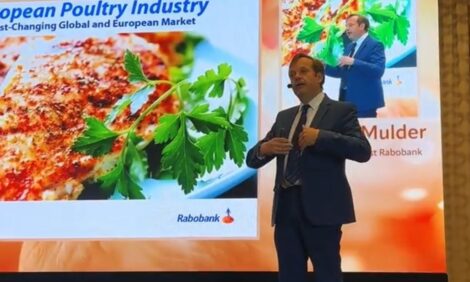



Genetically Modified Crops: Economic Consequences for the Egg Industry
Peter van Horne, IEC's Economic Analyst, presented the results of a report from the LEI research Institute in the Netherlands at the International Egg Commission (IEC) London 2009 Conference.Peter van Horne's report assessed the economic impact, now and in the future, of the current requirements for the EU to approve the use of genetically modified (GM) crops. He focussed his assessment on soybeans and maize, as these form the main ingredients of layer feed for hens.
Worldwide Increase in Genetically Modified Crops
Mr van Horne began by discussing the worldwide increase in using genetically modified crops, and used the USA, Argentina and Brazil as specific examples; all three have been increasing their use of GM crops during recent years. In 2000, just over 50 per cent of soybean plantings in the USA were genetically modified crops. By 2007, this had risen to over 90 per cent. In 2000, less than 10 per cent of Brazil's soybean planting was GM but this has been increasing rapidly and by 2010, it is forecast to account for 80 per cent. In comparison, Argentina has had a high level of GM crops since 2000, when over 80 per cent of its soybean planting was genetically modified and figures had reached 100 per cent by as early as 2006.
In 2007, over 70 per cent of the US maize crop was genetically modified, compared to over 60 per cent of Argentina's and just 50 per cent in Canada. Brazil is not yet using GM technology for its maize.
Implications for Europe
* "The EU needs to adopt an acceptable tolerance to allow non-improved varieties to be in shipments...and decrease the time period to approve new GM varieties." |
The LEI study shows that Europe is currently self-sufficient regarding maize although it imports soybean products from countries such as USA, Argentina and Brazil. If the EU approval on new GM varieties continues to be as slow and strict as it currently is, the future production chain for livestock farming, in particular the feed chain, will see a growing dependence on imports with higher feed costs. It is predicted that there will be an increase in imports of ready to go products, outside of the EU.
Peter van Horne discussed with the IEC delegates a study supported by the EU DG-AGRI, which assessed the impact of genetically modified organisms (GMOs) in Europe. With no change in the EU policy, it predicts a growing deficit of soybean, and a rise in feed prices which, in turn, will lead to an increased price for pork and poultry.
As there is an increasing worldwide acceptance of GM crops, it will become increasingly difficult for the EU to continue to adopt a zero tolerance attitude towards non-approved GM varieties.
Mr van Horne's study concludes that one solution to this ongoing problem is that the EU needs to adopt an acceptable tolerance to allow non-improved varieties to be in shipments. On the other hand, the EU should decrease the time period to approve new GM varieties.
Further Reading
| - | You can view other papers presented at the IEC London Meeting 2009 by clicking here. |
June 2009








